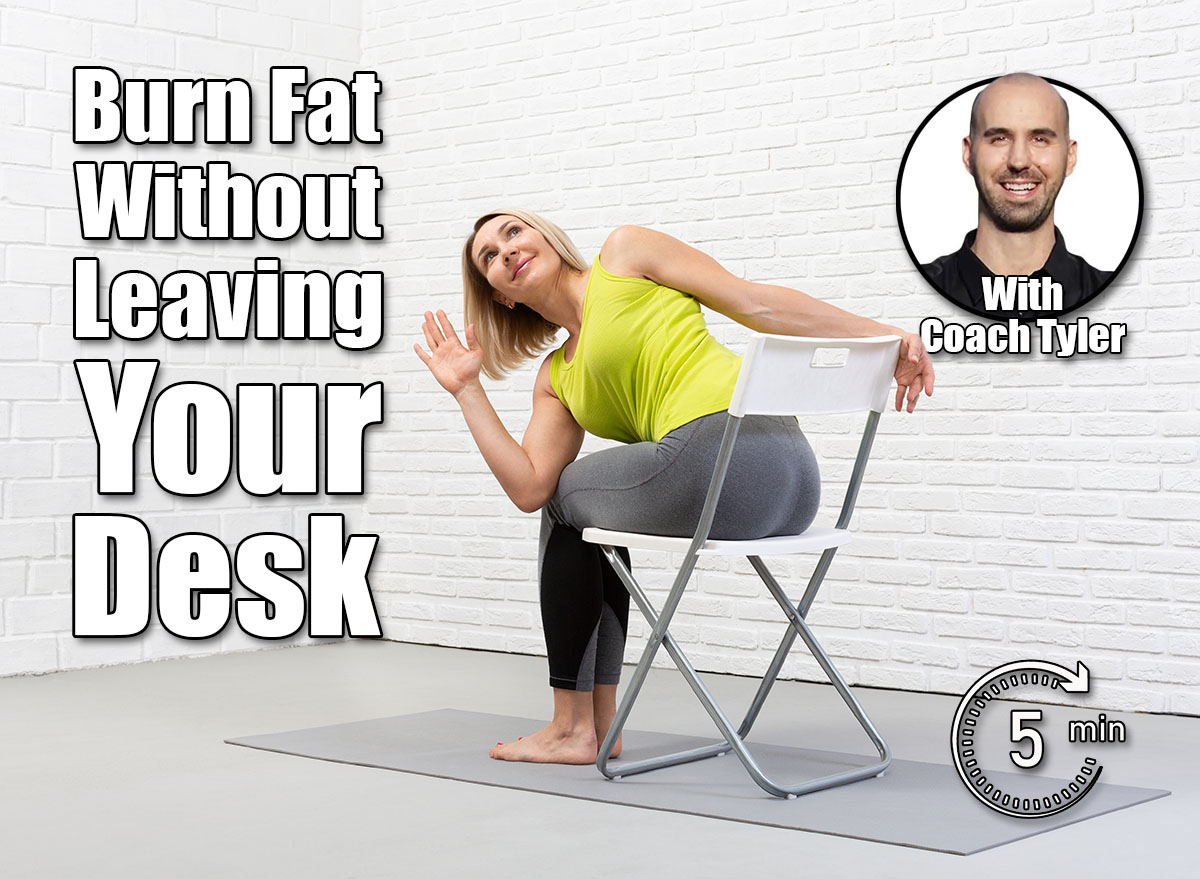Are you tired of feeling sluggish at your desk and worried about those extra pounds creeping up? Losing weight as an office worker might seem tough with long hours sitting down and constant deadlines.
But what if you could make simple changes that fit right into your busy day? Imagine feeling more energetic, confident, and healthy without drastic diets or expensive gym memberships. Keep reading to discover easy, effective ways to shed those pounds while working your regular office job.
Your healthier self is closer than you think.

Healthy Eating Habits
Office workers often find it hard to eat healthy because of busy days. Good eating habits help lose weight and feel better.
Choosing the right foods and planning meals can make a big difference. Small changes add up over time.
Meal Planning For Busy Schedules
Plan meals ahead to avoid unhealthy fast food or snacks. Preparing food saves time and controls portions.
Use simple recipes with few ingredients. Cook in batches and store meals for the week.
- Make a weekly grocery list
- Choose easy-to-cook healthy recipes
- Cook extra servings to save for later
- Use containers to pack meals for work
Smart Snack Choices
Choose snacks that keep energy up without adding too many calories. Avoid sugary or fried snacks.
Healthy snacks help control hunger and stop overeating at meals.
- Fresh fruit like apples or berries
- Raw nuts or seeds in small amounts
- Vegetable sticks with hummus
- Low-fat yogurt or cheese
Hydration And Its Role
Drinking water helps control hunger and boosts metabolism. Sometimes thirst feels like hunger.
Keep a water bottle at your desk. Drinking enough water supports weight loss and focus.
- Drink at least 8 cups of water daily
- Choose water over sugary drinks
- Drink a glass of water before meals
- Avoid too much caffeine or soda
Incorporating Movement
Office workers often sit for many hours. This can make it hard to lose weight.
Adding movement during the day helps burn calories and stay healthy.
Desk Exercises To Try
You can do simple exercises right at your desk. These keep your body active without leaving work.
Try stretching your arms, legs, and back. Small moves add up over time.
- Seated leg lifts to strengthen thighs
- Arm circles to improve shoulder mobility
- Neck stretches to reduce tension
- Seated torso twists for core activation
- Calf raises to boost circulation
Taking Active Breaks
Stand up and move every hour. Short breaks help your body and mind.
Walk around the office or do light stretching. This stops stiffness and burns more calories.
- Stand and stretch for 2-3 minutes
- Walk to the water cooler or printer
- Do a few squats or lunges
- Use stairs instead of the elevator
Walking Meetings Benefits
Walking meetings let you talk and move at the same time. This is good for health and focus.
Walking helps burn calories and reduces stress. It also improves creativity and energy.
- Burns extra calories during work hours
- Boosts blood flow and oxygen to the brain
- Reduces feelings of tiredness
- Encourages more active work culture
Optimizing Work Environment
Office workers spend many hours sitting at desks. This makes it hard to stay active and lose weight.
Changing the work environment can help increase movement and burn more calories.
Standing Desks And Alternatives
Standing desks let workers stand while working. This reduces sitting time and helps burn calories.
There are also alternatives like treadmill desks or balance boards. These encourage light activity during work.
- Standing desks raise energy use
- Treadmill desks add slow walking
- Balance boards improve core strength
Organizing Workspace For Activity
Arrange items so workers must move to reach them. This adds small bursts of activity throughout the day.
Place printers, trash bins, and water coolers away from desks. This encourages walking and standing breaks.
- Keep frequently used items within easy reach
- Put less-used items farther away
- Use open floor space for stretching or walking
Encouraging Team Participation
Group activities make moving more fun at work. Teams can support each other to stay active.
Organize short group walks or stretch breaks. Friendly challenges can boost motivation and weight loss.
- Schedule daily group stretch sessions
- Plan walking meetings instead of sitting
- Create step count contests with small rewards

Stress Management Techniques
Office workers often face stress from deadlines and long hours. Managing stress helps control weight and improve health.
Stress affects the body in many ways. Learning to handle stress can support weight loss efforts.
Impact Of Stress On Weight
Stress triggers the release of hormones like cortisol. High cortisol can increase hunger and fat storage.
When stressed, people may eat more unhealthy foods. This can lead to weight gain and low energy.
- Stress causes cravings for sugary and fatty foods
- Cortisol promotes belly fat accumulation
- Stress can reduce motivation to exercise
Quick Relaxation Methods
Short relaxation breaks during work help reduce stress fast. These can fit easily into a busy day.
Try simple techniques to calm your mind and body. Regular practice lowers stress hormone levels.
- Deep breathing for 2-3 minutes
- Stretching or light walking
- Listening to calming music
- Brief meditation or mindfulness
- Closing your eyes and visualizing peace
Balancing Work And Wellness
Keeping a healthy work-life balance is key to managing stress. This balance supports weight loss and well-being.
Set clear boundaries between work and rest times. Include time for physical activity and healthy meals.
- Take regular breaks away from screens
- Plan short workouts during the day
- Eat balanced meals and snacks
- Get enough sleep every night
- Talk to friends or family for support
Tracking Progress
Losing weight at the office can be hard without tracking progress. Seeing your results helps keep you motivated.
Tracking your weight, meals, and activities shows what works and what needs change.
Using Apps And Tools
Apps and tools make tracking easy and fast. You can record food, exercise, and weight on your phone.
Many apps give reports and reminders. They help you stay on track every day.
- Food diary apps track calories and nutrients
- Step counters measure daily activity
- Weight trackers show your progress over time
- Reminder apps keep you active during work breaks
Setting Realistic Goals
Set goals that you can reach. Small goals are easier and keep you motivated.
Realistic goals help you avoid frustration and keep going for a long time.
- Aim to lose 1-2 pounds per week
- Set daily step targets you can meet
- Plan simple healthy meals each day
- Include short exercise breaks during work
Rewarding Milestones
Celebrate your success to stay motivated. Rewards make your goals fun to reach.
Pick rewards that do not hurt your weight loss efforts.
- Buy new workout clothes after a month
- Enjoy a relaxing massage or spa day
- Try a fun new healthy recipe
- Take a day trip or short break

Frequently Asked Questions
How Can Office Workers Lose Weight Effectively?
Office workers can lose weight by combining regular exercise with a balanced diet. Prioritize walking during breaks and avoid sugary snacks. Staying hydrated and controlling portion sizes also help maintain calorie balance and promote steady weight loss.
What Are Easy Exercises For Office Workers?
Simple exercises like desk stretches, seated leg lifts, and standing calf raises improve circulation. Taking short walking breaks every hour boosts metabolism. Using stairs instead of elevators can also increase daily physical activity without disrupting work.
How Important Is Meal Planning For Weight Loss?
Meal planning helps control calorie intake and avoids unhealthy food choices. Preparing meals ahead ensures balanced nutrition and portion control. This strategy reduces reliance on fast food, supporting consistent weight loss and better energy levels throughout the workday.
Can Standing Desks Aid In Weight Loss?
Standing desks increase calorie burn compared to sitting. They improve posture and reduce sedentary time. Using a standing desk for part of the day encourages movement, which supports weight loss and overall health for office workers.
Conclusion
Losing weight at the office is possible with small changes. Stand more, sit less. Choose healthy snacks and meals. Take short breaks to move. Use stairs, not elevators. Stay hydrated with water. Plan your meals for the week. Get enough sleep each night.
These steps fit into daily routines. They help improve health gradually. Start today for better health tomorrow. Remember, every small step counts. Stay consistent and patient. Your body will thank you!


